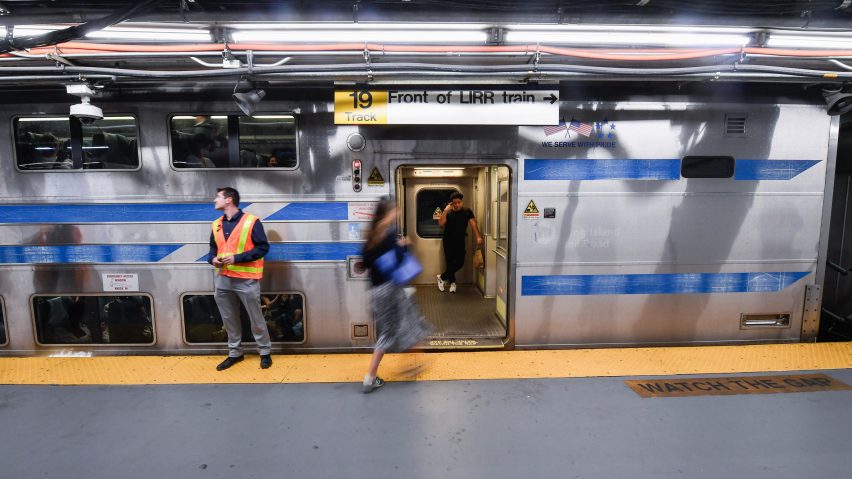
New York transit infrastructure risks "falling behind" after paused congestion pricing
Architects and transit officials have raised concerns over the well-being of New York's transit infrastructure after the plan to tax automobile drivers entering the city was paused by the state government.
The New York chapter of the American Insitute of Architects (AIA) and notable architects such as WXY Architecture founder Claire Weisz have raised alarms after a recent announcement that paused legislation aimed at reducing automobile congestion in Manhattan by charging a "congestion price" for vehicles entering the city.
The tax would have in part gone into backing financing for a $15 billion (£11.7) billion funding package meant to help fund repairs for the Metropolitan Transit Authority (MTA), the state-run body that manages New York's transportation infrastructure.
"The health and welfare of the most vulnerable New Yorkers depends on bold climate action and public transportation," said Weisz.
"New York needs congestion pricing now to raise $1 billion annually for the MTA, reclaim streets as public spaces, reduce emissions and improve air quality, and encourage transit use."
"Supporting NYC's economic recovery from COVID means investing in the 71 per cent of New Yorkers who ride transit, walk, and bike."
"Circumstances have changed," said governor Hochul
The New York Times reported that governor Hochul had announced an indefinite suspension on a tolling pricing initiative that would charge commuters $15 to enter parts of Manhattan, in part to reduce environmental impact and fund improvements to the MTA.
In a video released the same day, Hochul cited post-pandemic inflation and further "financial burdens" on "everyday New Yorkers" as her reasoning for the suspension.
"Circumstances have changed and we must respond to the facts on the ground – not from the rhetoric from five years ago," she said. "So, after careful consideration, I have come to the difficult decision that implementing the planned congestion pricing system risks too many unintended consequences for New Yorkers at this time."
"Our policies must support everyday New Yorkers and not add to their financial burdens."
"Everyone benefits from congestion pricing"
According to the New York Times, the "sudden" announcement has thrown the MTA into a financial scramble to replace the estimated $15 billion in financing backed by funding from the plan, which was set to begin 30 June 2024.
In an MTA press release from February 2024, the organisation cited congestion pricing as a crucial resource for funding improvements, repairs and expansions across the entire system including buses, the Metro-North Railroad and the Long Island Rail Road.
"Without congestion pricing, the MTA runs the risk of falling behind on repair work necessary to update aging infrastructure and assets critical to the reliability of the system," said the report.
According to the report, 80 per cent of the revenues generated by the tolling would have been allocated to the public transport system.
Beyond repairs and improved public transport, the MTA cited reduced vehicular traffic, improved air quality, and increased safety as other benefits of congestion pricing.
"Gridlock is bad for the economy, environment, and quality of life for people who live, work, and visit New York City – and it comes at a cost," said the MTA. "Employees on the clock waste time sitting in traffic. Workers get to their shift late because the bus is delayed. Plus, more traffic means more air pollution and associated health impacts."
"Everyone benefits from congestion pricing," it continued.
The New York chapter of the AIA, which has led "decades of advocacy efforts" towards congestion pricing noted that it is "deeply concerned" with the decision.
"AIA New York is deeply concerned with governor Hochul's plan to indefinitely suspend the implementation of New York City's Congestion Pricing," it said.
"As architects and design professionals, we are all aware of the successful examples implemented by our peer cities such as London, Stockholm, and Singapore, and we should not be left behind."
Some critics of the congestion pricing toll had cited increased congestion in outer boroughs such as the Bronx and already-low office occupancies as reasons to reconsider prior to the governor's announcement.
The MTA recently trialled safety barriers throughout several stations to reduce passengers falling or jumping down into tracks, and Hochul reportedly dismissed long-time development partner Vornado Realty Trust from long-sought renovation to Penn Station in Midtown Manhattan.
The images are courtesy of Marc A Hermann / MTA via Flikr.